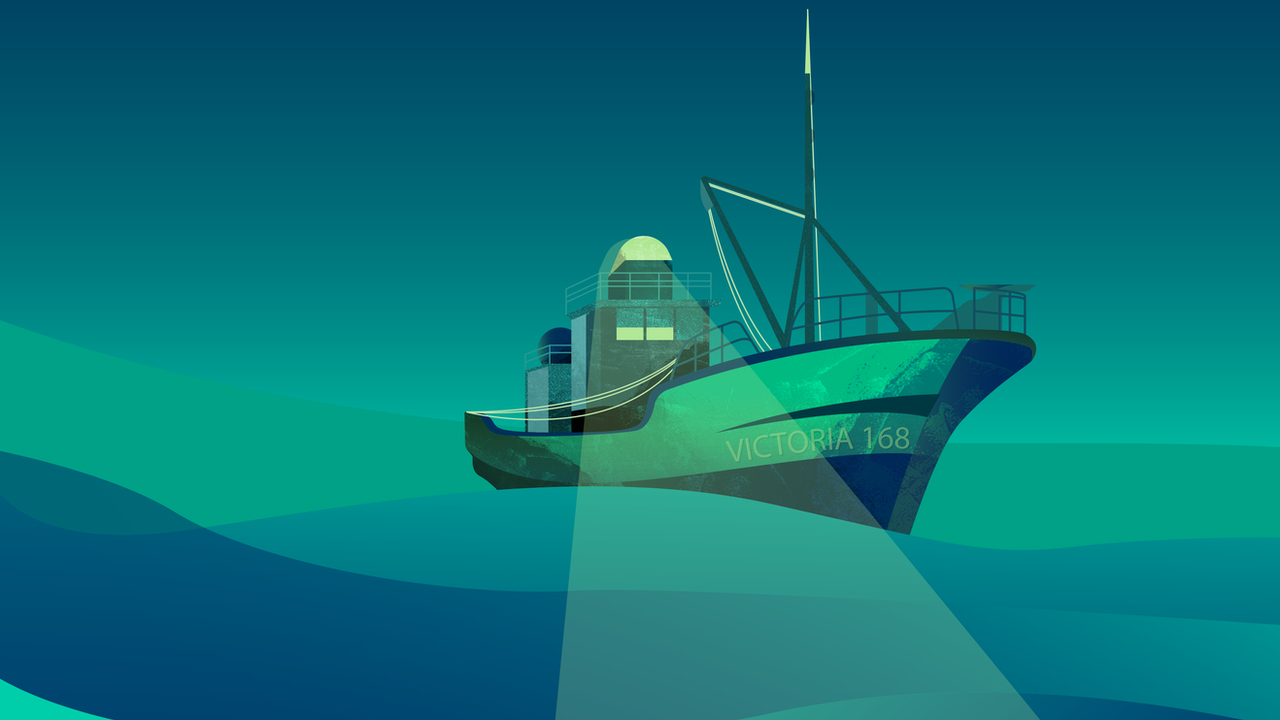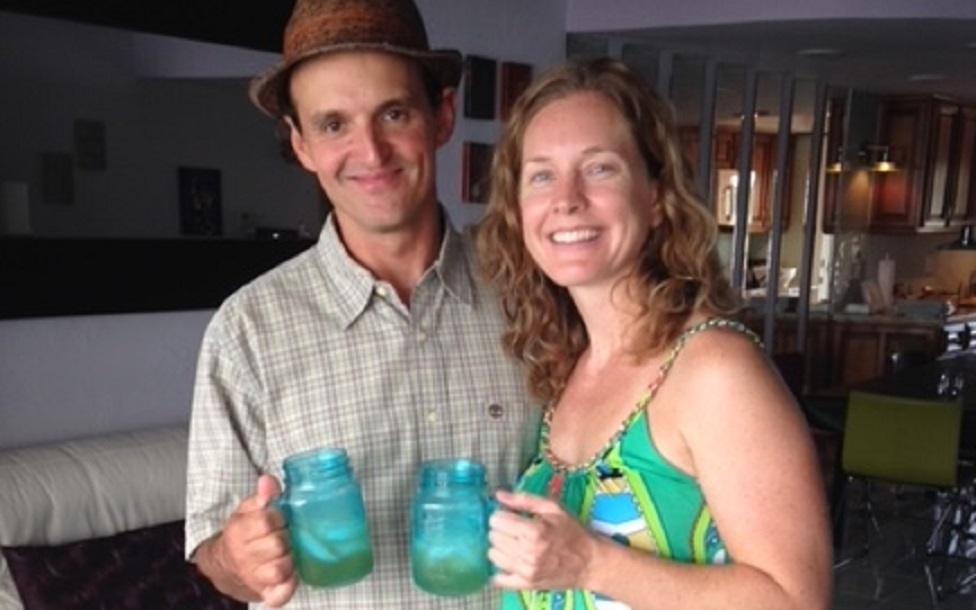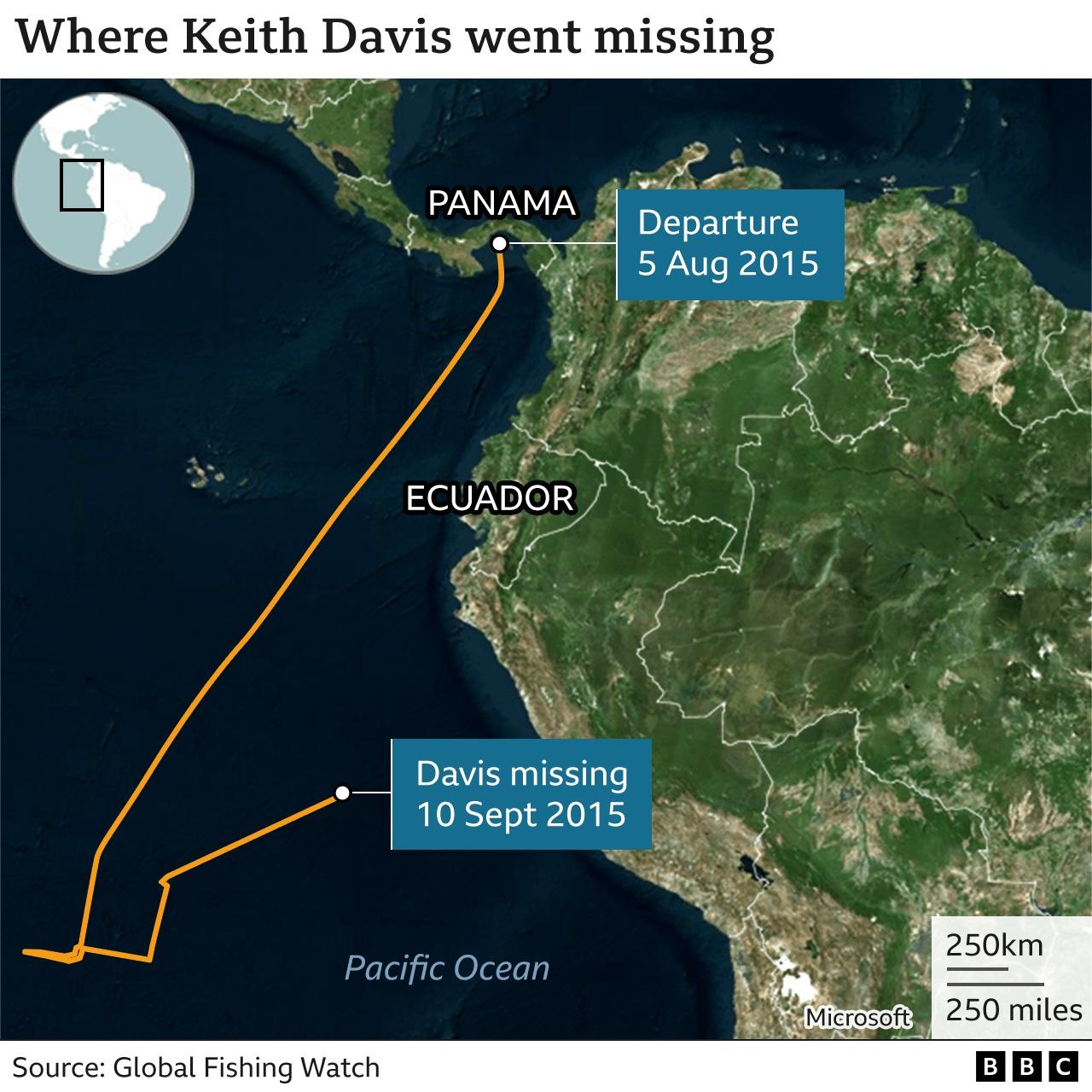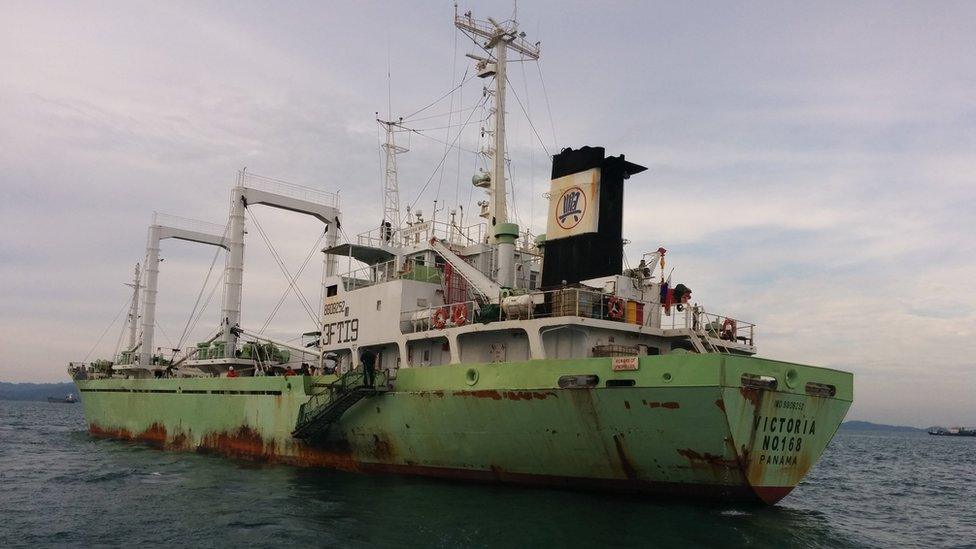Keith Davis: He was protecting the oceans - then he disappeared
- Published

Keith Davis disappeared at sea thousands of miles from home. His body has never been found. Now the mystery of his death has shone a light on a maritime world that is largely hidden from view, writes Rachel Monroe.
At my local grocery store in Texas, I can buy a can of tuna for less than a dollar. But, like many things that seem inexpensive, those low prices are only possible because of dangerous and largely invisible work happening far away - work that most of us will never know about.
Davis, an idealistic and adventure-loving ukulele player from Arizona, worked to make the invisible world of commercial tuna fishing visible. And he may have paid a price for it.
"He was very impulsive, very romantic, fly by the seat of his pants," said Anik Clemens, his friend and colleague. "He was so passionate about what he did. He wanted to protect the oceans, he wanted to protect the fishermen and their industry."
In 2015, in the midst of a seemingly routine voyage on the Victoria 168, part of a tuna fleet owned by a Taiwanese conglomerate, the 41-year-old vanished hundreds of miles off the coast of Ecuador.
The crew searched the ship, but found no sign of him. As word of his disappearance trickled back to his friends and colleagues on the mainland, many were instantly suspicious.
"He had 16 years of service. And there was no question in my mind that he was as professional and as careful and safe as anyone could be," said Bubba Cook, Davis's friend and the Western and Central Pacific Tuna Programme Manager for the World Wildlife Fund.
"The inevitable conclusion is that something had to have happened to him. To this day, I'm convinced that he saw something that the people that were on that vessel didn't want him to see."
Looking into his disappearance for new BBC podcast Lost At Sea led me into a fascinating world.

Find out more
Readers in the UK can listen to Lost At Sea on BBC Sounds
In the US and Canada, the podcast is available on Apple Podcasts, external
It will be available in other parts of the world in the coming months

Davis was a marine biologist who worked as a fisheries observer, a little-known profession that offers both great adventure and, in some cases, great risk. The estimated 2,500 observers are our eyes and ears on the oceans. They live on board fishing vessels for months at a time, venturing hundreds of miles offshore to protect those waters from overfishing, and to collect scientific observations that help us understand the health of our oceans and marine life.
Observers live among the crew, working the same gruelling hours in the same harsh conditions. But they are also sometimes viewed with suspicion, because part of their job is reporting illegal activity.
But what might Davis have witnessed that could've put him at risk? The high seas, where legal jurisdiction is complex and there is little oversight, are known for illegal activity - namely trafficking in drugs and weapons and even sometimes human trafficking. However, to be clear, we haven't seen anything that shows Davis witnessed any of those activities on the Victoria 168.
The boat he was working on at the time of his disappearance was engaged in what's known as transshipment.

Keith Davis was passionate about his work, says friend Anik Clemens
Transshipment vessels provide the longliner tuna fishing boats with fresh supplies and transport the freshly-caught fish back to shore. This process can enable some tuna longliners to stay out at sea for years at a time, which can help save on costs - and enable that 99-cent can of tuna I found on my grocery store's shelf.
Observers who witness illegal activity are in an incredibly vulnerable position. When Davis was working on the Victoria 168, his only means of communication to shore was via the captain's computer.
People doing his job are sometimes trained to speak in code in case they see something that's too sensitive to say out loud. Although Davis loved being an observer, he was also acutely aware of the job's perils. "Many of us who have served have witnessed gun activity, knife fights, slavery... much of which we have to swallow as 'part of the job,'" he wrote on Facebook the year before he disappeared.
Even more alarmingly, Davis's presumed death is hardly an isolated incident. A number of observers have vanished or died under mysterious circumstances - there were two more incidents during the months that we were working on the podcast.
Most of these cases get far less visibility than even Davis did. That's because many observers aren't adventurous American men, like Davis, but rather Pacific Islanders working to provide for their families. They're often from communities with a strong history of artisanal fishing - a localised industry that, in many cases, has been devastated by the intrusion of globalised fishing fleets that rely on transshipment.
When men like Charlie Lasisi, an observer from Papua New Guinea, or Eritara Aati Kaierua from Kiribas, died under suspicious circumstances, they didn't make headlines. But it's observers like these who are bearing the brunt of our desire to buy cheap tuna.

Davis's body has still not been found. Investigations by Panamanian authorities and the FBI were inconclusive.
"While we find the lack of resolution regarding what happened to Keith extremely upsetting, there's little else that we can do," his employer, MRAG Americas, said in a statement. "We continue to strive for maximum security for our observers deployed at sea and at land."
The Gilontas Group, the owner of the Victoria 168, has declined to comment on the case, which is still technically open, and also noted that "the Gilontas Group has cooperated with the authorities that conducted the investigation".
Officially, we don't know whether Davis died accidentally, took his own life, or was killed. But what we do know is that much of the illegal activity that takes place at sea relies on the idea that what happens far from shore, where there's no cell phone signals or security cameras, is essentially invisible to those of us on the mainland.

The Victoria 168, days after Davis went missing
The job of observers, to witness what happens at sea, can make them vulnerable.
"Observers don't have support from the fishing industry. They don't have support from the agencies. They don't have support from their employers, the contractors. In the end, they're by themselves," said Liz Mitchell, the former president of the Association for Professional Observers.
But over the course of my reporting, I found a host of people working to shed light on this unseen world.
The WWF's Bubba Cook has been tracking observers' unexplained deaths for over a decade. "One of the bigger problems is that we just don't know how many observers have been lost," he said. "Just here in the Pacific, it's been about one observer a year. And that's only [since] we started keeping records. How many before that died at sea under various circumstances, or never came home?"
There's also the Global Fishing Watch map, an open access tool that shows the locations of more than 65,000 shipping vessels from 2012 to the present moment.
By paying attention to stories like Keith Davis's, and Charlie's, and Eritara's, and by learning about what happens out on the high seas, we can make things safer for observers, for crews, and for our oceans.
Rachel Monroe is narrator and reporter on the BBC podcast Lost At Sea. She's a contributing writer at the New Yorker based in Texas, and the author of Savage Appetites: True Stories of Women, Crime, and Obsession